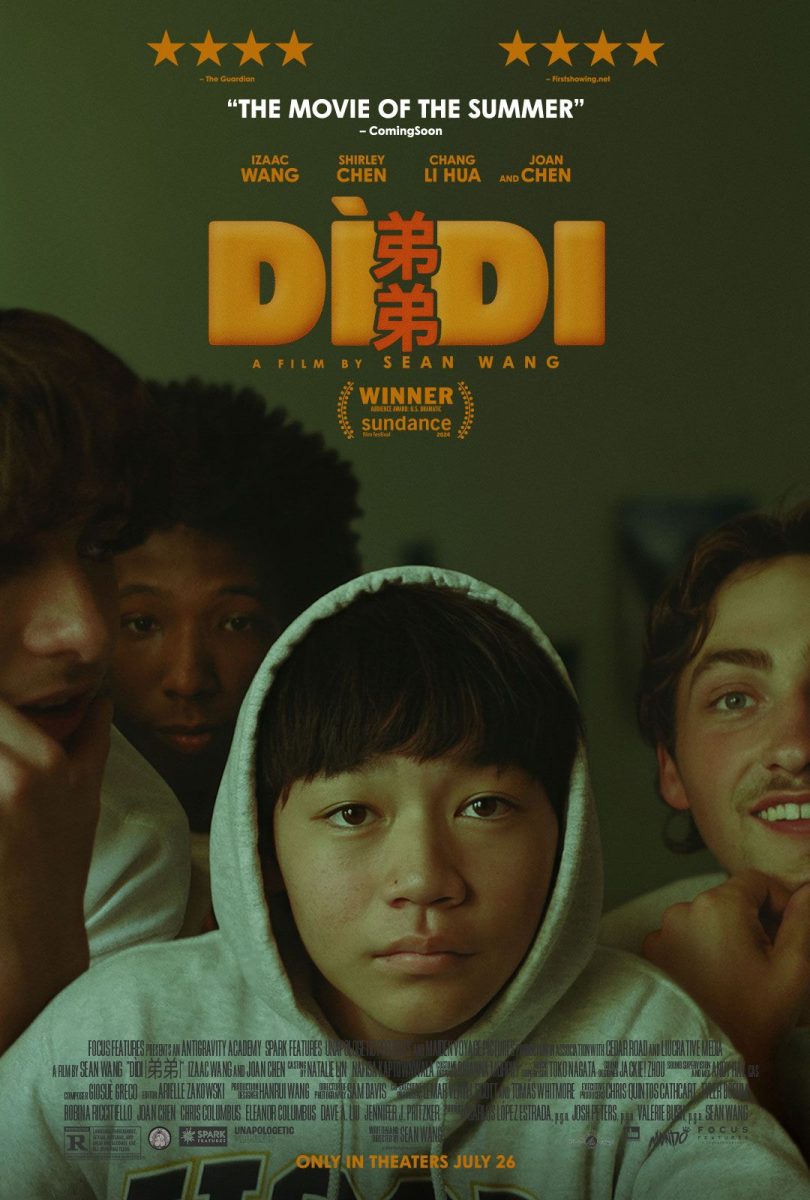A.B.C, meaning American-born Chinese, is something I often heard my parents call me and my brother when I was growing up. In the movie “Dìdi” by Sean Wang it chronicles his experience growing up as a Taiwanese American in Fremont, California, during the summer of 2008.
Comparisons may be drawn to other coming-of-age movies such as Mid90s, as both follow a skater main character just trying to fit in while navigating a complicated home life. However, Dìdi stands apart with how it portrays the Asian-American experience.
We follow Chris Wang the summer right before his first year of high school. He lives with his Mom, Nai Nai, which is grandma in Mandarin, and sister who’s leaving soon for college at UCSD.
Chris’s dad still lives in Taiwan and makes money before sending it to America for the family.
A main point touched upon in the movie is the generational trauma that often plagues traditional Asian households. We see Chris’s grandma constantly scolding and pointing out the mistakes made by the mom. This creates tension around the household and even worse, Chris is in the middle of it all.
As Chris gets into trouble in his day to day, such as getting into fights, his grandma directly blames his mom for letting it happen. She remarks that if her son, who is Chris’s dad, was in America none of this would be happening.
This experience isn’t unique as in Asian cultures the elderly are often treated with the utmost respect causing them to be rude or obnoxious. She believes she has the right to talk down to Chris’s mom since she is elderly and her son pays most of the bills.
The effect this has on Chris is apparent as he witnessed them yelling and arguing right before leaving the house to meet with his friends.
We see on Chris’s face that witnessing it clearly affected him in some way as on the car ride to meet his friends his sister asked him if he was okay and he didn’t say anything
Growing up Asian also causes Chris to struggle with fitting in. A common experience many Asian-born Americans struggle with. He tries his best to distance himself from his Asian identity as he believes it’s the best way to make new friends. In a way, Chris is ashamed to be Asian.
When Chris meets up with a girl he really likes she says that he’s “cute for an Asian”. This causes him later on in the movie to try and distance himself more and more from his Asian identity.
Farther into the film, he tries to fit in by becoming friends with a bunch of skaters. When he gets given the name “Asian Chris” He lies and says he’s only half Asian.
The next day the same group of people go to Chris’s house and ask his mom about Chris being half Asian where she confusingly says that he’s not. Chris hurriedly rushes his mom out of the room saying that she must have forgotten.
This backfires on Chris as they realize how weird it is for him to lie and treat his mom like that.
The best part of this movie is without a doubt the connection between Chris and his mom. How Sean portrays a traditional Asian family is genuine and something I relate to. The whole movie functions as a love letter to his mom, with the movie dedicated to her.
Throughout the movie, we see a contrast between Chris and his mom. Chris tries his best to not act Asian while his mom doesn’t try to hide it. She speaks to him in only Mandarin while he speaks to her in mostly English.
When out she uses an umbrella in the sun and eats a hamburger with a fork and a knife, something that Chris considers “so Chinese” causing him to groan and feel embarrassed.
A common theme among Asian households is that they aren’t very loving, however, this can’t be further from the truth, with Asian parents often being the most loving. They just struggle to show it.
In “Dìdi” this idea is shown as Chris and his mom often have a complicated and rocky relationship. His mom isn’t the stereotypical “tiger mom” shown in other movies, she dotes on Chris, takes care of him when he gets hurt and you can tell she genuinely cares.
Chris never realizes this however until near the end of the movie. She suggests for him to do something which he calls out for nagging or she shows him a beautiful painting of their family and he simply just says that “he looks weird”.
She calls him Dìdi, which means little brother in Chinese. Similarly, my mom calls me something along the same lines, Dai Dai, which means little brother in Cantonese. Both these terms are heartful and if you are referred to by them you can tell you are genuinely loved.
Near the end of the movie, Chris gets into a fight with someone causing his mom to scold him in the car, and only then is Chris able to finally let everything he had bottled inside.
In the best scene of the movie, Chris yells at his mother about how he’s sorry that he isn’t good enough for her and she yells back about how he could be so disrespectful. Both speak in different languages highlighting their differences.
Chris runs away and then comes back to see his mom in the morning. When seeing her again he simply asks if she’s ashamed of him and she explains that there’s no way she could ever be ashamed of him.

